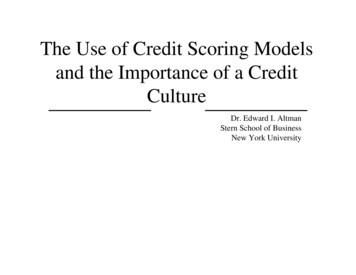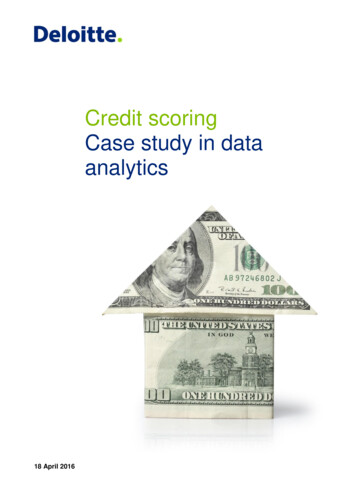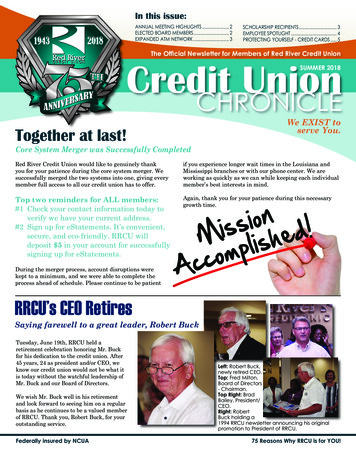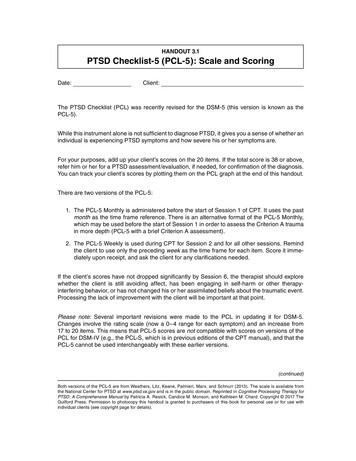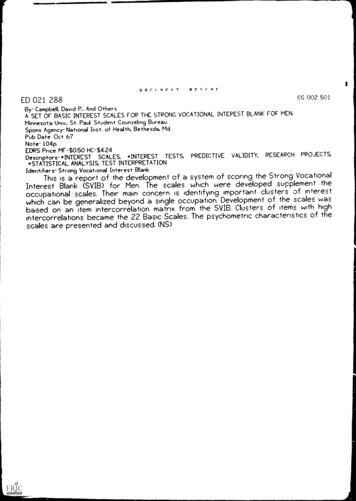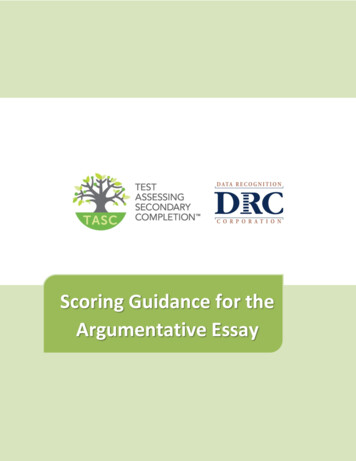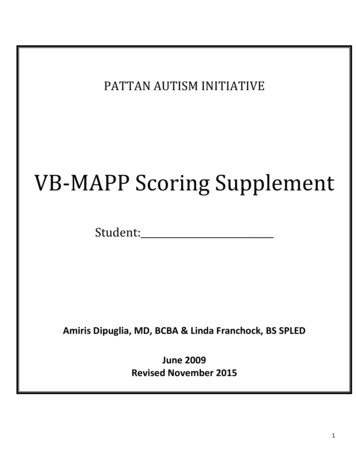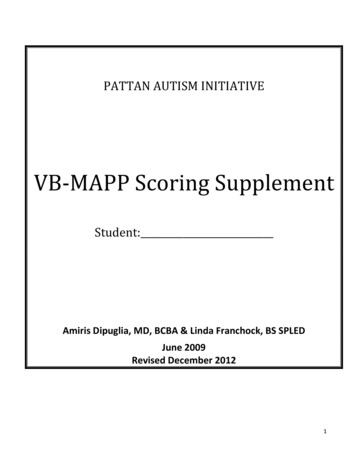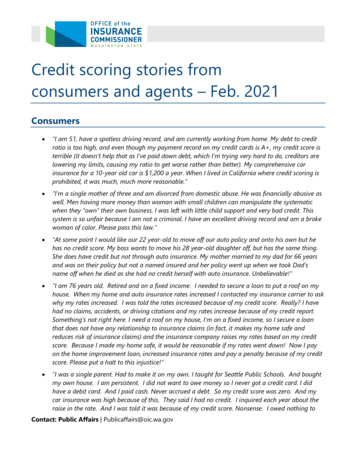
Transcription
OFFICE of theINSURANCECOMMISSIONERWASHINGTONSTATECredit scoring stories fromconsumers and agents – Feb. 2021Consumers “I am 51, have a spotless driving record, and am currently working from home. My debt to creditratio is too high, and even though my payment record on my credit cards is A , my credit score isterrible (it doesn’t help that as I’ve paid down debt, which I’m trying very hard to do, creditors arelowering my limits, causing my ratio to get worse rather than better). My comprehensive carinsurance for a 10-year old car is 1,200 a year. When I lived in California where credit scoring isprohibited, it was much, much more reasonable.” “I’m a single mother of three and am divorced from domestic abuse. He was financially abusive aswell. Men having more money than woman with small children can manipulate the systematicwhen they “own” their own business. I was left with little child support and very bad credit. Thissystem is so unfair because I am not a criminal. I have an excellent driving record and am a brokewoman of color. Please pass this law.” “At some point I would like our 22 year-old to move off our auto policy and onto his own but hehas no credit score. My boss wants to move his 28 year-old daughter off, but has the same thing.She does have credit but not through auto insurance. My mother married to my dad for 66 yearsand was on their policy but not a named insured and her policy went up when we took Dad’sname off when he died as she had no credit herself with auto insurance. Unbelievable!” “I am 76 years old. Retired and on a fixed income. I needed to secure a loan to put a roof on myhouse. When my home and auto insurance rates increased I contacted my insurance carrier to askwhy my rates increased. I was told the rates increased because of my credit score. Really? I havehad no claims, accidents, or driving citations and my rates increase because of my credit report.Something’s not right here. I need a roof on my house, I'm on a fixed income, so I secure a loanthat does not have any relationship to insurance claims (in fact, it makes my home safe andreduces risk of insurance claims) and the insurance company raises my rates based on my creditscore. Because I made my home safe, it would be reasonable if my rates went down! Now I payon the home improvement loan, increased insurance rates and pay a penalty because of my creditscore. Please put a halt to this injustice!” “I was a single parent. Had to make it on my own. I taught for Seattle Public Schools. And boughtmy own house. I am persistent. I did not want to owe money so I never got a credit card. I didhave a debit card. And I paid cash. Never accrued a debt. So my credit score was zero. And mycar insurance was high because of this. They said I had no credit. I inquired each year about theraise in the rate. And I was told it was because of my credit score. Nonsense. I owed nothing toContact: Public Affairs Publicaffairs@oic.wa.gov
anyone. I have had no accidents, made no claims, and have never gotten a ticket. I persisted withno luck. Finally, because of the high cost of car insurance, I did get a credit card and I havegradually developed a good credit score. But during the years I have spent a great deal of timeand energy battling this nonsense. So I thank you so very much for addressing the issue.Something has to be done.” “I have experienced severe increase in premiums in my auto insurance due to only credit scoring,I’m with the same company insured for 42 years, myself and my wife both age 60 and 61, no autoclaims ever, no tickets ever, had a nice low rate for 37 years, but in the last 5-7 years my rateswent up 25% with no claims solely due to my credit score getting worse due to fluctuations inincome due to sales commissions (only self-employed vs. being traditional salaried employee).This is not fair, the core driving rating factors especially driving record was clean but because ofonly the CREDIT SCORING my premium prices increased. OUCH, OUCH,OUCH. Please change thelaw. Other states have.”Agents “I am proud and very fortunate that, after 30 years in one career, to have found another career Ilove. One that I am able to continue to help people and provide a needed service. It is heartbreaking to tell someone that I can only provide them with a policy that they cannot afford.Again, thank you for the opportunity to speak to this. I had been intending to write you about thisfor some time. I am excited that you are taking the initiative to fight to overturn this policy.I had spent 30 years in the Hotel Industry, which was recently decimated due to COVID-19.Through no fault of their own, many of my former co-workers and friends woke up one daywithout a career. Some have had medical bills that they can't pay, some have not been able tokeep up with their credit cards just so they can pay their rent/mortgage, or feed their family. Arethese people a moral hazard? I think we can all agree that they are not.It is not due to poor life choices that a class of people, many impoverished, barely makingminimum wage, or nothing at all right now, that a basic need - transportation, and required bylaw to have insurance, that costs these poor people more money, money that they can't afford, justto be able to get to the store, or their new job, or even their old job. The cause and effect is thatthey are now forced to carry insurance at state minimum coverages, just to be able to afford todrive. If something does happen, and they don't have the adequate insurance to cover the loss,then society in general is hurt.Or perhaps they now can't afford UIM due to increased rates because of a poor credit score, andthe other driver, also recently hit with credit bills they can't afford to pay, doesn't have enough tocover their loss. Do you see the impact on society? It’s an endless loop, costing society more in thelong run.Insurance companies have every right to charge higher rates due to bad driving habits. These arechoices, but it is immoral and unethical to charge higher rates due to things that are beyond thedriver’s control. I am certainly happy to testify to this, as a former hospitality worker with manyfriends who are now out of work, and as one who was out of work for 8 months himself. I amproud and very fortunate that, after 30 years in one career, to have found another career I love.Contact: Public Affairs Publicaffairs@oic.wa.gov
One that I am able to continue to help people and provide a needed service. It is heart-breaking totell someone that I can only provide them with a policy that they cannot afford.Again, thank you for the opportunity to speak to this. I had been intending to write you about thisfor some time. I am excited that you are taking the initiative to fight to overturn this policy.” “Mr. Kreidler is right. We need to ban credit scoring because it is unfair and discriminatory. It is notan accurate loss indicator. I'm a long time insurance agent and I see it all the time. I just did anauto quote for someone with 0 tickets and 0 accidents and the rate was very high, because theyhave low credit. They pay cash for everything and have 0 debts. But this would be a great client,low risk. But the rate is unfairly high and they are punished for not having credit. Then I didanother quote for someone with two accidents but they had better credit. Their rate was low, butthey would actually be a worse risk. I rest my case.” “Agent for 23 years. Seen credit scoring affect hundreds of people. They were forced to find cheapinsurance with minimum coverage limits. This has a direct effect on the public-at-large. People aregrossly under insured or not insured at all due to the credit scoring model. Would love to see thisabolished.” “I own an insurance agency and have seen instances where an older client does not have creditcards, their house is paid off and their insurance score is a ‘No Hit’ so their premiums are higher.People who pay cash for everything end up paying higher premiums as well as people who havebad credit.” “I have worked in this industries for over 20 years. When they started using credit scoring forinsurance purposes, I knew that was wrong. Bad things can happen to good people. I don't knowone person who hasn't had a credit issue, this world already keeps people down. Get rid of it in theInsurance business.” “As an agent for more than 35 years, I have never understood the correlation between credit usageand risk for insurance. In theory, there may be a small impact but certainly not the up to 70%swing it can cause on auto rates with all other factors being the same. I firmly believe it ispredative and at most should be limited to 10% of the base rate filing. I myself have well over 800scores with all the different score and benefit with lower rates than most of my customers. I willhave to pay more if credit is no longer used as a factor. Fair rates should be predominately basedon my driving and claim history. It's the same sad story, we take advantage of the less fortunateand less educated members of our society. I applaud your desire to remove or at the very leastlessen the impact of credit in rating for auto insurance. Property insurance is affected more thanauto insurance with financial stability but again, much more than 10% is not justified. I applaudyour effort but have little faith that you will succeed given the strength of the insurance lobby. Toobad it has to be legislated, it should just be a directive of your department. Good luck!” “For years, I have felt that credit scoring is not fair and have had many discussions with otheragents about this issue. I have seen many claims on each side of the spectrum and credit reallydoesn't come into play. I would like to see credit taken out of the picture. Thank you for giving usa chance to express how we feel as well.” “I fully support Mr. Kreidler in this proposed change to eliminate credit scoring as a rating factorfor insurance. Over the years, I have seen many instances where this rating model hasdisproportionately affected black and brown communities. I know this is not exactly a race issue,Contact: Public Affairs Publicaffairs@oic.wa.gov
but it has been researched that White families have 10 times the net worth of Black families, and Ithink that having a financial criteria as part of the rating factor is not fair and with the lack oftransparency very questionable in the first place. In regards to a specific example, this year I had a client who's premium increased more than 700and the only difference between 2019 and 2020 was the credit scoring had changed due to beinglaid off and falling behind on a few bills. Again I fully support this proposed change and think it islong overdue.” “As a licensed insurance agent in WA since 1974, I have witnessed thousands of incidents sincecredit scoring was allowed that adversely effects the rates for poor, low credit or minorities andconcur with the OICs request to suspend credit scoring in Washington.” “Credit scoring algorithms ruin sales with honest people trying to find good insurance. They costagency millions in sales by insurers redlining business. This must stop. Washingtonians deservebetter and more affordable coverage.” “I am a licensed insurance person. I went through a bankruptcy in the past and saw from bothsides how credit scoring can affect insureds. By making credit scoring a basis for coverage cost, itprevented my ability to afford better insurance. The cost was prohibitive. So I carry state minimumlimits instead of a much better coverage. I saw this practice leave people uninsured but theinsurance provider certainly made a healthy profit. It was like charging you for having cancerwithout an exam. So more lower- income people cannot afford good coverage.” “I have been an insurance broker for 21 years and have seen quite a few issues with credit scoringbeing used improperly, especially when it comes to my clients retiring. Even though they mayhave credit scores over 750, the insurance companies will re-tier a client when they retire due tonot having as much income coming in. This alone allows the insurance industry to charge moremoney as the tier changes and never for the better. If the insurance companies are not going touse credit for the benefit of their clients then they should not be able to use it to their detriment. Itmust be used properly and not as a money grab.” “I understand the use of credit and how it may show the readiness of future payments. I also knowthat there are some people with low income who are more likely to file a claim. But, not all lowincome people will file a claim, they will want to keep their rates as low as possible.I had a potential client with great credit who financed a home right in the middle of my quotingprocess. This one change to his score resulted in a premium 300 higher than the exact samequote the previous month. Credit score usage is not fair and hurts more than just low incomepeople. When my own policy is up for renewal each year, I make sure my credit card is paid upand I don't use credit, I do everything to keep my rate low. It's a game I hate. There are otherfactors that should always be used such as previous claim history and driving records.” “Credit scoring can be an indicator, but can be completely unfair for hardworking individuals thatgo through a divorce, have a temporary hardship, or just don't have enough credit history. I haveseveral clients who have been impacted negatively and still have never had a loss or missed anypayments. People who are lower income and in racial groups can be paying significantly more,when they are the ones who can afford it the least! I strongly disagree that this should beconsidered in insurance rates.”Contact: Public Affairs Publicaffairs@oic.wa.gov
“I have worked in the industry for 22 years. From an objective standpoint, I have seen the datafrom within my company that does support those with bad credit having higher claims and billingissues client retention etc. vs. those on the other end of the spectrum. However there needs to besome subjectivity because I have witnessed dozens situations where someone has excellent creditwith relation to bank qualifications for credit, but yet they come back marginal on my system.Also there are those that pay cash for everything and don't need to borrow but yet they arepenalized as if they have no credit risk or inconclusive credit. We are forcing people to incur creditin order to rate them properly doesn't make sense. I also had a situation where my elderly clientlost her husband who had all their credit under his name and so when the system re-ran her creditafter the three years her rates shot up over 1,000 yearly just because of her credit score. I felt itwas really unfair to her just because she didn't have established credit nor had the need for credit. Iagree something should be done so consumers are not being broad stroked and or lumped into acredit category by accident.” “The point here is the credit rating system only does one thing right. When you have good credit,good for you! But it does everything else wrong. Furthermore, if someone DOES have bad credit,we may be putting desperate people in even more desperate situations. I mean, what kind ofbureaucratic drivel is being said that would make anyone think that "credit" is a better indicationof whether someone is accident prone than say – I don’t know – getting in accidents? Or maybedriving more distance?”Contact: Public Affairs Publicaffairs@oic.wa.gov
auto insurance with financial stability but again, much more than 10% is not justified. I applaud your effort but have little faith that you will succeed given the strength of the insurance lobby. Too bad it has to be legislated, it


